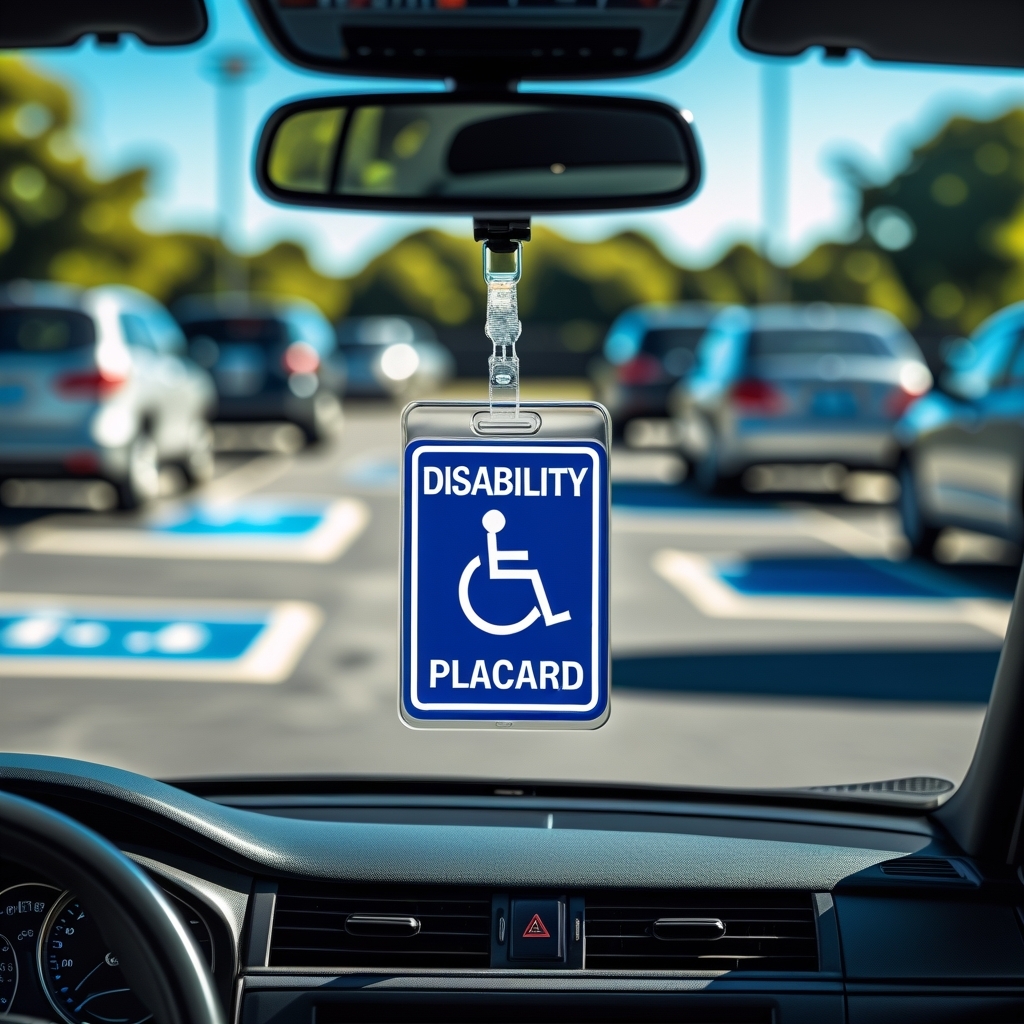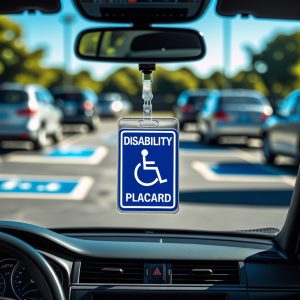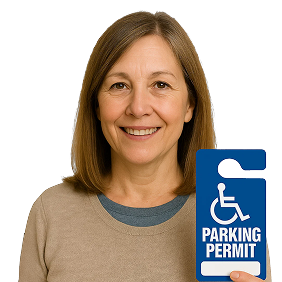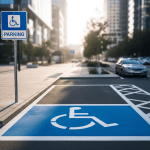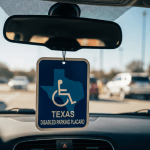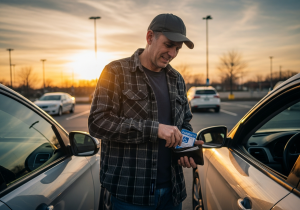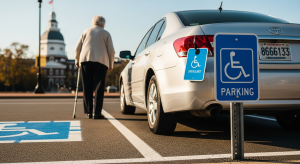Finding a parking spot shouldn’t be stressful, especially if you’re living with a disability or caring for someone who is. Yet, one of the first hurdles people face is simply figuring out how to get a handicap parking permit and how much it costs. The answer isn’t always clear. Some states give them out free, others charge a small fee, and the rules change depending on whether the permit is temporary, permanent, or for visitors.
If you’ve ever felt lost trying to piece together this information from multiple DMV websites, you’re not alone. This guide brings everything together, from the steps to apply online to what different states charge, plus special cases for visitors, veterans, and organizations. Here’s everything you need to know about handicap parking permit costs in the U.S.
What is a handicap parking placard?
A handicap parking placard, also called a disabled parking permit, is an official authorization that allows people with mobility challenges to park in designated accessible spaces usually close to the entrance. These spots are marked with the International Symbol of Access (the blue-and-white wheelchair sign) and are usually placed close to entrances of public buildings, healthcare facilities, and community areas.
Permits come in a few different forms:
- Placards hang from the rear-view mirror and can be moved between vehicles.
- License plates is issued by the state in place of a standard plate, showing the accessibility symbol.
- Decals or stickers are offered in some states to place directly on a plate.
Who qualifies for a handicap permit? Typically, it’s individuals who have limited walking ability, need assistive devices, or have chronic health conditions. For example, people with heart, lung, or neurological diseases often qualify, as well as those recovering from surgery.
It’s not only individuals. Organizations such as nursing homes, community care providers, and hospitals can also apply for permits if they transport people with disabilities regularly. Each application usually requires a doctor’s certification, confirming that the applicant meets the medical criteria defined by the state.
At its core, a handicap parking permit is about access and independence. It ensures people with disabilities can get where they need to go without the added struggle of finding a safe, nearby parking spot.
How much does a handicap placard cost in the U.S?
In most states, a handicap parking permit costs between $0–$20. Some states issue them for free, while others charge small administrative fees. You also have to pay a small fee for getting a doctor’s certification in order to obtain a handicap placard.
The answer is that it largely depends on the state where you live or the one you’re visiting. In most states, permanent placards are free, not accounting the health certification fee. On the other hand, some states charge a small administrative fee, usually between $5 and $20, especially for temporary permits. Handicap license plates almost always cost more, since they’re tied to the annual vehicle registration fee, with an extra disability plate fee added on top.
For example, in Florida, permanent placards are free for residents, but if you’re a visitor, you’ll pay $15 for a temporary permit. In California, permanent placards are free, while temporary ones cost $6. In Washington, both permanent and temporary placards are issued free of charge, though license plates carry registration and plate fees.
That’s why the information online can seem confusing, it all comes down to whether you’re applying for a placard, a plate, or a visitor permit.
Temporary vs. Permanent Permits
The type of permit also affects cost.
- Temporary permits are usually valid for 3 to 12 months and often carry a small fee, such as $5–$15. They’re designed for people recovering from surgery, injuries, or short-term medical conditions that limit mobility.
- Permanent permits, on the other hand, are generally free. They last longer (usually several years), but renewals often require updated medical certification which costs an additional fee.
- License plates aren’t free. They cost the same as your car’s annual registration plus a small extra fee for the disability plate.
Visitors and veterans
If you’re traveling, most states will honor a placard or plate from another U.S. state, but some, like Florida, require visitors to apply for a temporary visitor permit at a cost of around $15.
Veterans with service-connected disabilities often qualify for fee waivers or discounted plates, depending on the state.
Cost of Handicap Placard in Every U.S. State
Here’s a quick reference table covering the disabled parking permit cost across all 50 states plus D.C as per the Department of Motor Vehicles. These prices are subject to changes as state DMV rules change. Keep in mind that obtaining a health certification will cost you a small fee apart from these prices.
|
State |
Permanent Placard |
Temporary Placard |
License Plate |
|
Alabama |
Free |
Free |
$23 |
|
Alaska |
$10 | $15 |
$10 |
|
Arizona |
Free |
Free |
Standard Registration Fee |
|
Arkansas |
Free |
Free |
Standard Registration Fee |
|
California |
Free |
$6 |
Standard Registration Fee |
|
Colorado |
Free |
Free |
Standard Registration Fee |
|
Connecticut |
Free |
$5 |
Standard Registration Fee |
|
Delaware |
Free |
Free ($20 for Temp. registration tag) |
Standard Registration Fee |
|
Florida |
Free |
$15 |
Registration Fee + $28 |
|
Georgia |
Free |
Free |
Registration Fee + $20 |
|
Hawaii |
Free |
$12 |
Registration + $5 -$6 |
|
Idaho |
Free |
Free |
Registration Fee+ $25 (Personalization) |
|
Illinois |
Free |
Free |
Registration + $29 |
|
Indiana |
Free |
$5 |
Registration + $9.50 |
|
Iowa |
Free |
Free |
Registration + $25 (personalization) |
|
Kansas |
Free |
Free |
Registration + $5.50 or $6.50 |
|
Kentucky |
1st is Free ($10 for all subsequent ones) | $10 |
Registration + $18 |
|
Louisiana |
$3 |
$3 |
Standard Registration Fee |
|
Maine |
Free |
$1 |
Standard Registration Fee |
|
Maryland |
Free |
Free |
Registration + $20 |
|
Massachusetts |
Up to $60 depending on type | Free |
Standard Registration Fee |
|
Michigan |
Free ($10 replacement) |
Free ($10 replacement |
Registration + $5 |
|
Minnesota |
Free |
$5 |
Registration + $15.50 |
|
Mississippi |
Free |
Free |
Standard Registration Fee |
|
Missouri |
Free |
$2 |
Standard Registration Fee |
|
Montana |
Free |
Free |
Registration + $12 |
|
Nebraska |
Free |
Free |
Standard Registration Fee |
|
Nevada |
Free |
Free |
Standard Registration Fee |
|
New Hampshire |
Free |
Free |
Registration + $10 |
|
New Jersey |
Free |
$4 |
Standard Registration Fee |
|
New Mexico |
Free |
Free |
Standard Registration + One-time Fee |
|
New York |
Same as License Plate |
Free |
Registration + $28.75 |
|
North Carolina |
$5 |
$5 |
Registration + $36 |
|
North Dakota |
Free |
$3 |
Standard Registration Fee |
|
Ohio |
$3.50 |
$5 |
Registration + $35 |
|
Oklahoma |
Free |
Free |
Standard Registration Fee |
|
Oregon |
Free |
Free |
Registration Fee + One-Time Fee |
|
Pennsylvania |
Free |
Free |
Registration + $14 |
|
Rhode Island |
Free |
Cost vary |
Standard Registration Fee |
|
South Carolina |
$1 |
$1 |
Registration + $36 |
|
South Dakota |
Free |
$5 minimum |
Standard Registration Fee |
|
Tennessee |
$26.50 |
$10 |
Registration + $26.50 |
|
Texas |
Free |
$5 |
Registration + $3 |
|
Utah |
Free |
$5 |
Registration + $15 |
|
Vermont |
Free |
Free |
Standard Registration Fee |
|
Virginia |
Free |
Free |
Registration + $10 annually |
|
Washington |
Cost vary |
Cost vary |
Registration + $117 |
|
West Virginia |
Free |
$3 |
Registration + $51.50 |
|
Wisconsin |
Free |
$6 |
Registration + $15 |
|
Wyoming |
Free |
$50 (Increases every 30-days) |
Standard Registration Fee |
|
District of Columbia |
Free |
$13 |
Standard Registration Fee |
Key factors that affect the handicap placard cost
When it comes to handicap parking permit cost, there isn’t one national standard. Each state makes its own rules, and that means the price depends on where you apply, the type of permit you need, and even whether you’re a resident or just visiting.
State-by-state rules
Every DMV sets its own fee structure. For example, the Washington State Department of Licensing requires placard holders to renew every five years, with a doctor’s sign-off for eligibility. Florida takes a different approach, charging $15 for visitor permits while offering free permanent placards for residents. Other states, like California and Texas, waive fees entirely for permanent placards.
This variation is why many people find the process confusing, two neighbors from different states may pay very different costs for essentially the same permit.
Medical certification requirements
Another factor is medical paperwork. Most states require a healthcare provider’s certification to confirm disability, but some go further by demanding re-certification at each renewal. That can add indirect costs, since doctor visits are rarely free. Florida and Washington are examples of states that require healthcare provider verification to keep a placard valid.
Visitor vs. resident permits
If you’re traveling, you may wonder whether your placard works in another state. Thankfully, most states honor placards from outside jurisdictions under reciprocity rules. But in some cases — such as Florida’s temporary visitor program — you’ll need to pay a fee and apply locally. For long-term stays, this ensures you’re covered by local enforcement rules.
The costs for different types of permits
The cost of a disabled parking permit isn’t just about the state you live in, it also depends on the kind of permit you’re applying for.
Individual permits
For residents, permanent placards are usually free, while temporary ones may cost a small fee, often between $5 and $15. Some states also charge small amounts for replacements if your placard is lost or stolen. Renewal cycles vary widely: some states require renewal every five years, while others issue permits indefinitely until a change in medical status.
Organizational permits
Organizations that regularly transport people with disabilities, such as non-profits or assisted living centers, can also apply for permits. These are typically issued as placards or plates assigned to a vehicle. While costs vary in the U.S., the structure can charge an annual fee of about $31. U.S. organizations generally pay administrative or plate fees tied to registration too.
Veteran and military permits
Many states waive fees for veterans with service-connected disabilities. In fact, some offer free Disabled Veteran license plates, which carry both recognition and parking privileges. Rules differ state by state, so veterans should check with their local DMV to confirm eligibility.
Additional disability permit costs you should know about
The advertised cost of a permit isn’t always the whole story. Even if a placard is free, there can be extra expenses along the way.
- Replacement fees: If your placard is lost, stolen, or damaged, some states charge $5–$10 for a replacement.
- Medical paperwork: Doctor certifications, especially for temporary or renewable permits, can add an extra amount each time you renew depending on insurance.
- Processing or admin fees: A few states attach small administrative charges.
- Private parking costs: It’s important to know that having a placard doesn’t guarantee free parking everywhere. Some private lots and garages may still charge regular rates, even if the space is marked accessible.
These hidden costs can add up, which is why many people want a clear picture before applying. Understanding both the visible fees and the indirect costs helps you plan ahead and avoid surprises.
How to apply for a handicap parking permit (and what it costs you)
Applying for a handicap parking permit is fairly straightforward, but the steps (and costs) depend on your state. Here’s the general process most people follow:
The step-by-step application process
- Check eligibility – Review your state’s guidelines. Qualifying conditions often include mobility impairments, chronic illnesses, or medical conditions.
- Get the application – Forms are available online through your state’s DMV website, local DMV offices, or authorized service centers.
- Doctor signs certification – A licensed healthcare provider must confirm your condition and complete the medical section of the form. This is often the step that slows people down. Services like ParkingMD make it easier by connecting you with licensed physicians online for quick, state-compliant medical evaluations, without the need for an in-person visit.
- Submit with fee (if required) – Most permanent placards are free, but temporary placards may cost $5–$20 depending on the state.
- Receive your permit and ID card – Placards are usually mailed to you, while plates are tied to vehicle registration.
Renewal process and costs
Temporary placards typically last up to six months and must be renewed if the condition continues. Renewal often requires another doctor’s certification and a small fee.
Permanent placards generally renew every five years, but most states don’t charge a fee. Some states, like Washington, require new medical paperwork with every renewal.
Plates renew annually with your vehicle registration, and fees vary by state.
Replacing a lost or stolen placard
If your placard is lost, stolen, or damaged, most states allow replacements for a small fee (usually $5–$10). Some waive the cost if you provide a police report. Replacement times range from a few days to several weeks, depending on your DMV.
Do Handicap Permits Work Across States? Reciprocity Rules
Yes, U.S. handicap parking permits are valid in every state, but you must follow local parking rules when you travel.
One of the biggest concerns for drivers with disabilities is whether their handicap placard will be honored outside their home state. The good news: most U.S. states recognize out-of-state permits. This means if you travel, you can typically use your existing placard without applying for a temporary one.
However, there may be local differences in time limits or parking rules. For example, some cities may cap the hours you can stay in metered spaces, even with a valid placard. Always double-check posted signs or state guidelines before parking.
The bottom line
The handicap parking permit cost in the U.S. is generally low, ranging from free to about $20, depending on your state, the type of permit, and your situation. While fees are minimal, it’s important to also consider indirect costs, like doctor certifications or renewal paperwork.
Ultimately, a placard or plate offers far more value than its small price tag, providing safe and accessible parking when you need it most. Before applying, always check your state DMV website for the most accurate, up-to-date information on fees and requirements.
FAQs
How much does it cost to get a disabled parking permit in Florida?
In Florida, permanent permits are free for residents with qualifying disabilities. Temporary permits cost $15 and are valid for up to six months. If renewed within 12 months of issuance, the renewal is free.
Can I use my disabled parking permit in other parts of the U.S.?
Yes. Most states honor out-of-state permits under reciprocity rules, but time limits and meter rules may differ by city. Always check local signage before parking.
Is handicap parking free in all states?
No, permanent placards are free in most states, but temporary placards often cost $3-$15 with an additional small fee required for health certification. License plates always carry additional fees above registration costs.
How much does a disabled placard cost in California?
Permanent placards are free in California, while temporary placards cost $6. License plates require standard registration fees with no additional disability fee.
What do new handicap placards cost by state in the USA?
Prices vary by state from free to $20, with most permanent placards free and temporary ones costing $3-$15 depending on your state’s DMV fee structure.

